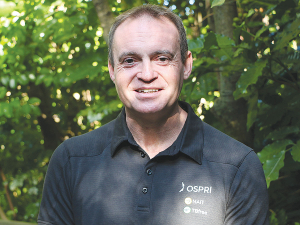We must keep our foot on the pedal
OPINION: Last week marked a major step forward in our work to eradicate Mycoplasma bovis.
 Kevin Forward says poor NAIT record keeping can lead to delays in the response and increased spread of the disease.
Kevin Forward says poor NAIT record keeping can lead to delays in the response and increased spread of the disease.
OSPRI New Zealand says - following the resurgence of M. bovis in Mid Canterbury in late 2022, and concerns raised over poor NAIT record keeping and non-compliance - it is increasing its level of education and support to farmers in the region.
OSPRI's head of traceability, Kevin Forward says the organisation is committed to supporting farmers to understand their NAIT obligations and the importance of adopting good on-farm traceability practices as part of their overall biosecurity preparedness.
"The ability to manage a disease outbreak, contain it, and work towards its eradication relies on accurate traceabilit records," he explains. "Simply put, we all have a role to play when talking traceability and biosecurity, everyone must do their part for the system to work and for the industry to be protected."
He points out that poor NAIT record keeping can lead to delays in the response, increased spread of the disease and increased cost to farmers and the country.
Forward says OSPRI had launched a targeted support campaign to farmers in the Wakanui area.
It aims to help farmers get their NAIT accounts sorted and OSPRI is launching a NAIT education campaign in the greater Ashburton district.
OSPRI's local regional partner, Fiona Caldwell will be running a series of NAIT workshops, drop-in centres, and webinars for farmers to help them understand their NAIT obligations and why traceability is important.
In addition to this, OSPRI and the Ministry for Primary Industries (MPI) will be piloting an early intervention programme for those farmers in the region who are identified as not meeting their NAIT obligations.
The purpos of the early intervention programme is to reach out to farmers to offer support and education, so they understand what their NAIT obligations are, as a person in charge of animals, and know where to get help.
"We're trying to support farmers so they can avoid getting to the point where they're receiving infringements or being prosecuted for non-compliance with NAIT," Forward says.
"Now is not the time to be getting complacent, we need to be thinking not only about the diseases that we are trying to eradicate currently, but also about what could potentially hit us next. We've spent over five years working to eradicate M. bovis from New Zealand, that's a lot of hard work that the industry and individual farmers have all put in. The same applies for bovine TB, except over a longer period."
For more information: https://www.ospri.co.nz/news/lets-protect-our-industry-mid-canterbury/
According to the latest Federated Farmers banking survey, farmers are more satisfied with their bank and less under pressure, however, the sector is well short of confidence levels seen last decade.
Farmer confidence has taken a slight dip according to the final Rabobank rural confidence survey for the year.
Former Agriculture Minister and Otaki farmer Nathan Guy has been appointed New Zealand’s Special Agricultural Trade Envoy (SATE).
Alliance Group has commissioned a new heat pump system at its Mataura processing plant in Southland.
Fonterra has slashed another 50c off its milk price forecast as global milk flows shows no sign of easing.
Meat processors are hopeful that the additional 15% tariff on lamb exports to the US will also come off.